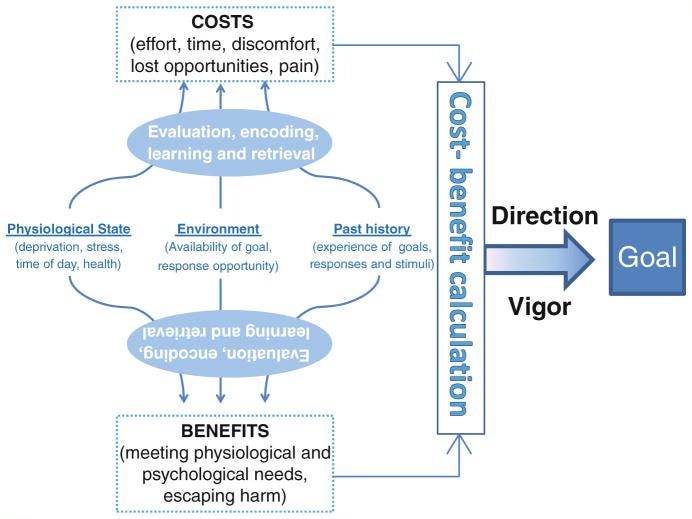The word motivation is often used to describe how one feels about getting a task done or reaching an objective. “I don’t feel motivated enough to go to the gym” is a common complaint!
Many people close to me have discussed how to build motivation. I figured it would be a good idea to approach this problem scientifically!
Why you should read ahead:
Learn how to define motivation, which is the first step to building it.
Understand the multifactorial nature of motivation and read about the cost-benefit model.
Read about the two types of motivation, and how our childhood shapes it.
Once you have understood motivation, you can read ahead to understand what disrupts motivation and how substance abuse contributes to it.
Read about a 5 step process to learn how to set goals that stick.
The scientific definition of motivation
Without understanding it, one can never master it.
If you want to increase your motivation towards a particular task, or life goals in general, understanding the meaning of motivation is paramount.
To be motivated means to have the desire to act in order to achieve a particular goal. Authors of the paper titled “The Behavioral Neuroscience of Motivation: An Overview of Concepts, Measures, and Translational Applications” state that motivation can be defined as:
The energising of behaviour in pursuit of a goal
In other words, it is the behaviour directed towards achieving a goal, the goal of which is deemed rewarding.
So, to be motivated you need to :
Have a goal
Think that achieving that goal will be a reward.
Let’s say you’re working in a company with monthly targets. Let’s say those targets involve something that doesn’t interest you much- like more profits for a manufacturing company.
It makes sense that, the motivation to achieve those targets on time, will be difficult to muster for those people who don’t believe in the purpose of the company and feel as though the profits of the company are not in accordance with their own purpose.
I have struggled with motivation in terms of meditation. I somehow cant find even 10 minutes in a day to be calm and sit down with myself. Its clear to me now that the possible reason for this is the lack of a specific goal.
Although I am aware that meditation will lead to a calm mind, and make me feel more “present” in the today, those are not tangible goals for me. However, the moment my sleep begins to get disturbed, I can maintain the habit of meditation for a consistent period.
The reason for this is that the goal has now become clear: Meditate to sleep better.
Motivation is Multifactorial
Many tend to blame themselves for a lack of motivation. “I’m not a motivated person” is something I often hear. It seems as though people think that motivation is a personality trait.
While the ability to be motivated might have an element of personality, science shows that there are a million other factors that influence motivation.
Take, for example, the circadian rhythm. Lack of motivation can occur due to a lack of regular, restful sleep! Or, say, the environment. If you have suddenly entered a completely new environment- like a new School or locality- the fatigue from being so heavily stimulated is bound to influence your motivation.
The main factors that influence motivation are:
Your internal physiological state.
Your environment.
Your history or past experiences.
Cost-benefit analysis as the driver of motivation
A subset of the aforementioned concept is the process of cost-benefit analysis as a driver of motivation.
Dr. Elanor H Simpson and Professor Peter Balsam, research scientists from the department of Psychiatry, Columbia University, have simplified the concept of this driver of motivation.
Their image below explains it perfectly:

The image above shows how the motivation toward a specific goal is shaped by the mental process of cost-benefit calculation.
Imagine you are thinking about going to the gym regularly. The following three factors are bound to interact:
Your physiological state-
Your stress levels.
How healthy you feel.
Or what time of day do you choose to visit the gym.
Your environment-
Your working hours will determine the time left to visit the gym
How close the gym is to your home (or place of work)
Other responsibilities like having to care for children and their needs
Past History
Previous successful (or unsuccessful) efforts at maintaining a gym habit
The experiences at the gym (positive, such as experiencing an endorphin flow, or negative, such as embarrassment)
The above will enter your brain and undergo the process of encoding, learning, and retrieval of memories to evaluate the costs and the benefits.
The final weighting of the costs versus benefits will influence how determined you are to visit the gym and how much vigour and direction you will pursue the goal of visiting the gym regularly.
Types of Motivation
Experts have divided motivation into two types based on how we respond:
Approach motivation: The motivation to approach something which is derived from past experiences that have taught us that there is a reward at the end.
Avoidance motivation: The motivation to fight, or fly away because we believe that there is possibly a punishment waiting for us.
Normally, our behaviours are influenced by a healthy balance of the two. These “types” of motivation are built during early childhood. They are based on intrinsic drivers of motivation and extrinsic drivers.
Imagine a child trying to assemble a puzzle. It tries, fails, and then tries again.
The child’s curiosity is the intrinsic driver of the motivation to complete the puzzle. Extrinsic drivers, such as encouragement from the parents may also contribute.
If the child manages to complete the puzzle and receives praise for it, the reward received will act to motivate future puzzle completion goals. Who knows? The child may even end up becoming a master puzzle solver with age!
Disruption of Motivation
We have now discussed the definition of motivation, the cost-benefit analysis that goes on in the brain every time someone experiences motivation towards a goal, and the potential drivers of motivation.
However, the biggest struggle we face today is when there is a lack of motivation. When one feels a loss of the motivation they once had to complete a task- like maintaining consistency with their workouts.
Some reasons why the normal motivation process may be disrupted are:
Childhood experiences:
Parental control is a good thing when it comes to protecting a child from dangerous exposures like holding a sharp knife. However, a constant attempt to control the child’s environment might result in a situation where the child lacks the curiosity necessary to develop intrinsic habits which drive motivation in the future.
Reward vs. punishment is an important childhood experience, the balance of which is paramount. Let’s take the puzzle example above. If that child is discouraged from solving puzzles, ridiculed for doing it wrong, or ignored when the task is completed, the child might lack the extrinsic drives necessary to develop the puzzle-solving skill.
Short-term pleasure:
Addictive substances or practices that lead to short-term pleasure are responsible for messing with the motivational neuronal pathways in the brain.
Substance abuse, alcohol, and even regular casual sex are some ways in which one can seek pleasure and gain it easily.
The neurochemicals released in response to such pleasure are the same ones which are released when a particular goal is perceived as rewarding and its those same neurochemicals that are responsible for driving the motivation to achieve that goal.
If one were to expose the neural network to these neurochemicals constantly via, say, substance abuse, it makes sense that the brain would lack the ability to perceive the difference between the short-term pleasures and pleasure of achieving a long-term goal.
In this case, it’s easy to imagine why one would lack the motivation to “set their life straight” but turn to substance abuse instead.
As a symptom of a disorder or psychiatric illness
I have mentioned this point as a title here to highlight that a lack of motivation could be a symptom of a mental illness. However, I cannot explain this further as I am NOT an expert and would do injustice to the subject. Psychiatric help is always available, and I encourage you to seek it if you feel there might be something wrong.
Goal setting: How to set goals that stick
Setting SMART goals is an intelligent way to set targets (wink). If you are from a management or quality improvement background, you have probably heard of this before!
SMART stands for Specific, Measurable, Achievable, Relevant, and Time-Bound.
Let’s say you are trying to build the habit of reading, but are lacking the motivation to do so.
If I were to phrase the goal as: “I want to read more” it would be difficult to achieve. However, if we try to make it smart, it would sound something like this:
I want to improve my reading habit by reading 10 pages of a book every day, increasing this amount to work towards finishing 1 book a month by the end of this year.
This goal is specific because it specifies the habit I want to improve, and how.
The improvement is measurable as I can check by ensuring that I am reading at least 10 pages a day.
It’s achievable as I know I can find time for a minimum of 10 pages.
This goal is relevant to me (as opposed to learning how to ride a unicycle).
And Timely- There is an end “target” of by the end of the year. This will help me analyse my progress as the year goes on.
This habit is not only useful to set goals and try to achieve them, but also to seed out the slightly unachievable, and far-stretched targets that we tend to set for ourselves.
I remember countless weeks spent trying to reach unachievable educational targets I would set for myself during university: Finish 5 chapters in 5 days! Easy. 1 chapter a day. I would often find myself stuck on chapter one by the end of 5 days….
So!
I hope you enjoyed reading this (or listening to it).
As always, Happy Reading :)






Clear and concise, whilst providing great detail! Especially enjoyed the exmple of the child and how the intrinsic motivation was curiosity and wanting to figure it out- we can learn so much from a child that we may have forgotten! I thought about why I started running recently- My dad used to tell me to run as it was good for me, but it was only after I had a reason that came from within, that I started :)